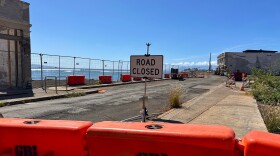When the Bayudan family moved to Lahaina from the Philippines over 30 years ago, they worked in hotels and even picked up side hustles like cleaning public parks. Eventually, they saved enough money to buy their family home.
Krizhna Bayudan, a 23-year-old born and raised in West Maui, said her home was full of fruit trees planted by her late grandparents, who were farmers. She still remembers the sweet smell of bananas, papayas, sweet potatoes, and marunggay.
Her father was a carpenter and had just renovated their house in 2019, making it the perfect size for a family of six.

But the Aug. 8 wildfire ripped through West Maui's historic town, killing at least 100 people. More than 3,600 properties were damaged, including the Bayudan home, which she said was the pinnacle of her parents' hard work immigrating to the United States.
"It was heartbreaking to hear my dad a couple of days after the fire saying that all he wanted to do was go back home," she said.
It's been more than three months since the fire, and many of Lahaina's immigrant communities are facing the dilemma of deciding whether to wait and rebuild or leave their homes forever.
Roughly one-third of Lahaina's population is foreign-born, according to U.S. Census figures. They come from the Philippines, the Pacific islands, and parts of Latin America.
Filipinos comprise 40% of Lahaina, while Latinos make up about 11%. However, that number could be higher because some immigrants might be undocumented.
An uncertain future
Immigrants and migrants are currently in temporary housing provided by the American Red Cross until Feb. 10, according to a draft report by the House Shelter Working Group.
But it's unclear whether displaced individuals will be placed in permanent housing by that time. State officials have said that rebuilding Lahaina could take three to five years.
Bayudan said she and her family moved from different hotels five times since their house burned down. Then she overheard her parents talking about moving to California or Nevada – a conversation she wished she never heard.
"That all makes me sick to my stomach because this is the home that I've always imagined myself living in and nowhere else. These are where our roots are placed," Bayudan said.

Much of that sentiment is widespread as many immigrant and migrant families face an uncertain future.
Veronica Mendoza-Jachowski co-founded a community-based organization, Roots Reborn Lahaina, immediately after the fire. She provided immigrants and migrants with translators while directing them to housing and other resources.
She said families are exhausted from constantly relocating. But what's new to Mendoza-Jachowski is a sense of hopelessness among the community.
“There’s a lot of desperation, we have folks who have already moved multiple times – up to seven or eight times,” she said. “They don’t know where they’re going to be sleeping next.“
Service providers like Mendoza-Jachowski have been trying to get as much information as possible to Lahaina's immigrant population in their languages.
The Federal Emergency Management Agency extended its deadline to Dec. 9 for impacted homeowners and renters to apply for assistance.
However, some immigrants may not qualify, depending on their immigration status.
Mendoza-Jachowski said that if at least one person in the household is a U.S. citizen, they can qualify for FEMA assistance.
The Shelter Working Group found that non-citizens, including migrants from three Micronesian nations, and undocumented individuals are at significant risk of displacement after a natural disaster due to a lack of federal support.
A glimmer of hope
However, Lahaina resident Nicolas Elizalde said he doesn't qualify for FEMA.
Elizalde only spoke Spanish during an interview with HPR, with Mendoza-Jachowski translating.

Elizalde moved to Lahaina from Mexico 15 years ago. He had many jobs, including cleaning hotels, condos, vacation homes, warehouses, and parking garages. He made enough to care for his wife, parents, children and grandchild.
When the fire came, he said he lost his car, his $26,000 in savings, and his American dream. But he's also hopeful for a future in Lahaina.
"By God, we have food, and we have a roof," Elizalde said in Spanish. "This past week was the first time in three months that I had a full week of work. Little by little, we're going to work at it and we're going to lift ourselves up again."
He said his motivation to stay in Lahaina is his family. He advised other immigrant families to keep working and "don't back down."
"Don't fall into depression," Elizalde said in Spanish. "On the contrary, It's the opposite. We should be fighting with more life and more clarity for why we're here. We're here for family, we're here to work and we're here to pick ourselves up again."







